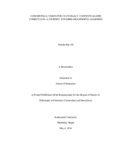
Please use this identifier to cite or link to this item:
https://hdl.handle.net/20.500.14301/320Full metadata record
| DC Field | Value | Language |
|---|---|---|
| dc.contributor.author | Oli Raj, Jitendra | - |
| dc.date.accessioned | 2023-06-18T07:59:30Z | - |
| dc.date.available | 2023-06-18T07:59:30Z | - |
| dc.date.issued | 2014-05-04 | - |
| dc.identifier.citation | Oli ,J.R | en_US |
| dc.identifier.uri | https://hdl.handle.net/20.500.14301/320 | - |
| dc.description.abstract | This dissertation depicts my multifaceted and emergent inquiry into the problem of culturally decontextualized curriculum practices of students and teachers in classroom. Teaching and learning were basically teacher centered, meaningless (i. e. algorithmic and abstract) and locally detached from students' life world. I generated initial research questions on the basis of my experiences as a student of school and university levels and as a school teacher of Science and Mathematics subjects of a secondary school. Through an autobiographical excavation of my experiences of teacher centered and decontextualized teaching and rote learning based on centralized curriculum materials, I came up with four emergent research questions leading to four themes of inquiry: culturally decontextualized and fragmented curriculum materials, culturally decontextualized and meaningless learning, traditional and impractical teaching, and centralized curriculum and textbooks. I used a multi-paradigmatic research design space to articulate the inquiry. I applied mainly the paradigms of interpretivism, criticalism and postmodernism under a ii multi-paradigmatic research space. The critical research paradigm offered self reflection to critically identify the research problem and to reflect my experiences as a student and a teacher. The paradigm of postmodernism enabled me to construct multiple genres based on my experiences of culturally decontextulized learning and teaching, fragmented subjects and meaningless and impractical learning, whereas the paradigm of interpretivism enabled me to employ self reflection. Within this multi-paradigmatic design, I chose narrative inquiry, critical research and self study as the methodological referents. Narrative inquiry helped me to present and generate learning and teaching experiences and practices as stories, scenes and contexts, whereas critical research enabled me to reflect critically on my personal practical experiences and knowledge for transformation in constructivist ways. Self study helped me to generate and present my personal practical knowledge and professional practices to move forward. The visions cultivated through this research include the following aspects for culturally contextualized curriculum and meaningful learning: (i) classroom interaction between student and teacher, (ii) cultural examples, knowledge, daily life activities, students' experiences and prior knowledge, (iii) classroom management, movable furniture and small group teaching, (iv) active participation and engagement, (v) teacher preparation and teachers' effort to blend local, cultural and central subject matters in teaching and learning. | en_US |
| dc.language.iso | en | en_US |
| dc.publisher | Kathmandu School pf Education | en_US |
| dc.title | CONCEIVING A VISION FOR CULTURALLY CONTEXTUALIZED CURRICULUM: A JOURNEY TOWARDS MEANINGFUL LEARNING | en_US |
| dc.type | Dissertation | en_US |
| local.school.name | SOED | en_US |
| local.school.department | DOLE | en_US |
| local.school.level | M.Phil. | en_US |
| Appears in Collections: | Dissertation | |
Files in This Item:
| File | Description | Size | Format | |
|---|---|---|---|---|
| Final version_Jitendra Raj Oli.pdf | 1.6 MB | Adobe PDF |  View/Open |
Items in DSpace are protected by copyright, with all rights reserved, unless otherwise indicated.